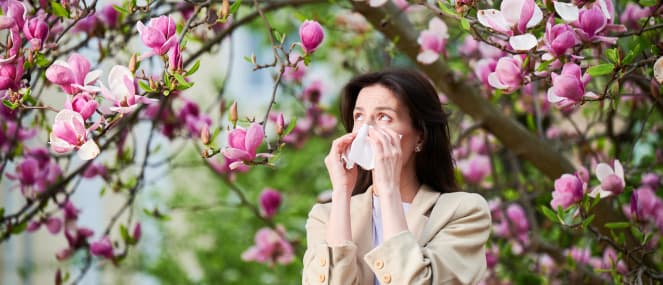
- Health hub/
- Tips & Advice on Improving your Everyday Health/
- Hay fever season


By Jodi Van Dyk. Hay fever season is on its way. You can feel it in the air. The weather is warming up, winds are increasing, flowers are beginning to bloom and the magpies are out! Making the transition from the chilly months into spring can be a nightmare for some people. The beautiful flowers that begin to pop up around this time of year and the increase in wind mean pollen counts are high. Many people are allergic to high pollen count in the air and suffer from itchy eyes and throat, runny nose and generally feel run down. This type of allergy is often known as a seasonal allergy as it occurs at around the same time every year.
So what can you do to make this transition a little easier?
I have spoken about the merit of using vitamin C, horseradish and garlic in a previous blog to help with a runny nose and inflammation. Also try the following lifestyle tips:
Eat well – Be sure to eat a balanced whole food diet at this time to give your body all the nutrients it needs to keep you healthy, even if you have allergies. Be sure to drink lots of water. As I have said before, this may help to flush out allergens and histamine that cause inflammation.
Sleep – Be sure to indulge in 7-8 hours sleep a night to help you recover from allergic reaction to pollens during the hayfever season.
Stay indoors – Where possible try to stay indoors, particularly on days when there is a lot of wind and/or a high pollen count.
Recommended reading from the Blackmores library:
Jodi Van Dyk has been a fully qualified practicing naturopath for 2 years after completing her Bachelor of Health Science degree in Naturopathy in 2007. Prior to becoming a Naturopath she studied a Bachelor of Science at the University of Sydney and worked as a microbiologist in a large hospital pathology laboratory for 5 years. These days Jodi splits her time between working with patients on issues ranging from women’s health, hormonal imbalances, immunity and children’s health as well writing, teaching and researching within the natural health industry. As a Naturopath Jodi combines her science background and evidence based research with traditional knowledge of naturopathy. She is passionate about natural medicine and teaching those around her the benefits of approaching health from a perspective of prevention whilst using natural approaches.




